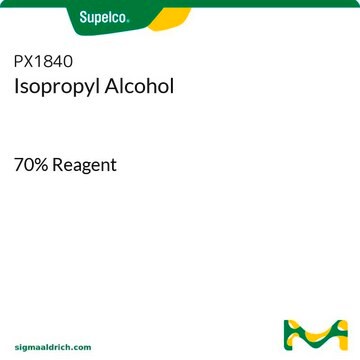W292912
Isopropyl alcohol
natural, ≥98%, FG
Synonym(s):
2-Propanol, sec-Propyl alcohol, IPA, Isopropanol, Isopropyl alcohol
About This Item
Recommended Products
biological source
botanical
Quality Level
grade
FG
Fragrance grade
Halal
Kosher
natural
Agency
follows IFRA guidelines
reg. compliance
EU Regulation 1223/2009
EU Regulation 1334/2008 & 178/2002
FDA 21 CFR 172.515
vapor density
2.1 (vs air)
vapor pressure
33 mmHg ( 20 °C)
44 mmHg ( 25 °C)
Assay
≥98%
autoignition temp.
750 °F
expl. lim.
2.0-12.7 %, 93 °C
greener alternative product characteristics
Less Hazardous Chemical Syntheses
Use of Renewable Feedstocks
Learn more about the Principles of Green Chemistry.
sustainability
Greener Alternative Product
refractive index
n20/D 1.377 (lit.)
bp
82 °C (lit.)
mp
−89.5 °C (lit.)
density
0.785 g/mL at 25 °C (lit.)
application(s)
flavors and fragrances
Documentation
see Safety & Documentation for available documents
food allergen
no known allergens
fragrance allergen
no known allergens
greener alternative category
Organoleptic
alcohol; ethereal
SMILES string
CC(C)O
InChI
1S/C3H8O/c1-3(2)4/h3-4H,1-2H3
InChI key
KFZMGEQAYNKOFK-UHFFFAOYSA-N
Looking for similar products? Visit Product Comparison Guide
General description
Application
- Different solvents and organic modifiers for the control of crystallographic parameters in nano-crystallite hydroxyapatite for amplification of photocatalytic activity.: This study demonstrates how isopropyl alcohol, used as a solvent, can control the structural properties of hydroxyapatite nanocrystals, enhancing their photocatalytic performance in environmental applications (Kawsar et al., 2024).
- Preparation of a sustainable magnetic sorbent for the extraction and preconcentration of progestogens in natural water samples.: The study utilizes isopropyl alcohol in the synthesis of a novel, environmentally friendly sorbent for water purification processes, addressing the crucial need for removing contaminants from water (Aguinaga Martínez et al., 2024).
- Rational synthesis of methylsilsesquioxane aerogels addressing thermal load and compression recovery issues in Li-ion batteries.: This research highlights the use of isopropyl alcohol in synthesizing advanced materials that improve the safety and efficiency of lithium-ion batteries, a critical component for sustainable energy solutions (Li et al., 2024).
Signal Word
Danger
Hazard Statements
Precautionary Statements
Hazard Classifications
Eye Irrit. 2 - Flam. Liq. 2 - STOT SE 3
Target Organs
Central nervous system
Storage Class Code
3 - Flammable liquids
WGK
WGK 1
Flash Point(F)
53.6 °F - closed cup
Flash Point(C)
12.0 °C - closed cup
Choose from one of the most recent versions:
Already Own This Product?
Find documentation for the products that you have recently purchased in the Document Library.
Customers Also Viewed
Our team of scientists has experience in all areas of research including Life Science, Material Science, Chemical Synthesis, Chromatography, Analytical and many others.
Contact Technical Service



